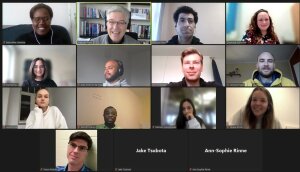
In October 2013, the Ruhr University Bochum (RUB) was admitted to the Microeconomics of Competitiveness (MOC) Affiliate Network at Harvard Business School. Nine years later, Prof Matthias Kiese offers the MOC course developed by leading management professor Michael E. Porter for the 16th time this semester, supported by Simon Rohde as co-instructor. Offered in a virtual exchange format, the current edition is the seventh consecutive online MOC class at RUB.
15 students from RUB and TU Dortmund participate in this innovative course offered by RUB’s Institute of Geography. Despite its small size, the class once again represents remarkable variety with six different study programmes. As usual, most students represent RUB’s Faculty of Economics with its Economic Policy Consulting and Management and Economics programmes. Five students come from TU Dortmund’s spatial planning master programme. Three students represent the home institute’s master programmes Transformation of Urban Landscapes and Geography, while one student majors in the International Political Economy of East Asia.
Needless to say, class discussions once again benefit from the international and interdisciplinary mix of participants. “This diversity of backgrounds and experiences enriches our discussions enormously”, rejoices Prof Kiese, as the course is built around case studies on the competitiveness of countries, regions and firms, as well as their spatial concentration in so-called clusters. MOC comprises eleven case studies this semester, including classics such as the Japanese fax industry and the Californian wine cluster, but also modern favourites like the Dutch flower cluster, Mayor Bloomberg’s economic development strategy for New York City, or creating shared value in Peru’s education sector. As in previous semesters, today’s discussion of the Dutch flower cluster case was led by Dominika Kuberska, an Assistant Professor of Economics at the University of Warmia and Mazury in Olsztyn, Poland.
Students complete the course with group projects, each group analysing the competitiveness of a cluster of their own choice. Additional motivation comes from a World Cup-style contest. The best case study from Bochum will enter a competition with 120 universities worldwide, which are part of the MOC network. The winner will be honoured at the annual MOC affiliate workshop in Boston. In 2016, a RUB student team managed to claim the prestigious trophy with a case study on Frankfurt’s financial services cluster. For this semester, student groups once again selected very topical cases, including the renaissance of the German photovoltaic cluster. Supply shortages and geopolitical risks spurred a recent surge of investment and subsidy announcements in the semiconductor industry around the world, which is taken up by another group studying the respective cluster in South Korea. A third group looks into the Beijing/Zhongguancun information technology cluster with its increasing focus on artificial intelligence.
Further information about MOC can be found here:
http://www.isc.hbs.edu/resources/courses/moc-course-at-harvard/Pages/default.aspx
https://www.geographie.ruhr-uni-bochum.de/arbeitsbereiche/stadt-und-regionaloekonomie/microeconomics-of-competitiveness
https://www.geographie.ruhr-uni-bochum.de/oekonomie/moc.html.en
http://news.rub.de/studium/2016-12-13-internationaler-wettbewerb-bochumer-sind-weltmeister-der-clusteranalyse
Bochum, 30 November 2022 Prof Dr Matthias Kiese